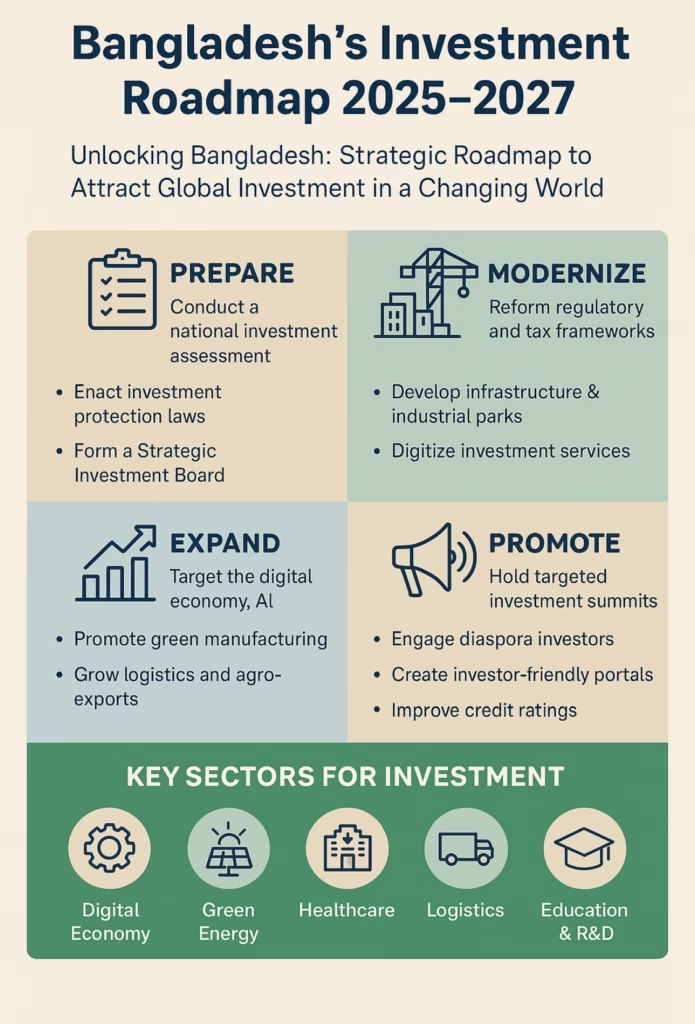As Bangladesh positions itself beyond the ‘least developed’ label and transitions into a competitive emerging economy, the global investment landscape presents both a challenge and an opportunity. This article outlines a strategic framework for Bangladesh to attract and retain serious international investors by focusing on foundational research, infrastructure modernization, sectoral prioritization, and global investor confidence-building mechanisms.

I. Introduction: Why Bangladesh Must Act Now
The global investment race has intensified. Countries with fewer resources but greater foresight are rebranding their economies through strategic policy, digital transformation, and investor-friendly ecosystems. Bangladesh—with a population of over 170 million, a burgeoning middle class, rising digital adoption, and an average 6%+ GDP growth over a decade—is on the cusp of becoming an investment magnet. But potential alone doesn’t attract capital—readiness does.
II. The Global Investor Mindset in 2025
Modern investors—especially in private equity, venture capital, infrastructure funds, or green bonds—are looking for:
Political stability and legal clarity Investment protection and repatriation guarantees Ease of doing business Skilled labor and cost advantage Digital and logistics infrastructure ESG (Environmental, Social, Governance) alignment Strong domestic consumption or export potential
Bangladesh ticks some boxes, but major reforms and strategic repositioning are needed to meet 2025 expectations.
III. First Steps: National-Level Preparation for Investment Readiness
1. Conduct a National Investment Climate Assessment
An evidence-based investor perception study must be launched—benchmarking Bangladesh against Vietnam, Indonesia, Kenya, and Turkey in:
Ease of doing business Tax regime transparency Corruption perception Infrastructure gaps Digital readiness Legal recourse for investors
Deliverable: A flagship report titled “Why (and Why Not) Invest in Bangladesh: 2025 Investor Climate Report”
2. Reform Policy and Regulatory Bottlenecks
Policy inconsistencies, unclear tax rules, and bureaucratic delays discourage investors. Critical reforms include:
Enforce time-bound approvals via digital portals Tax holidays with sunset clauses for priority sectors Enactment of a Comprehensive Investment Protection Act A full overhaul of BIDA (Bangladesh Investment Development Authority) into a digital-first one-stop service
3. Build the Right Institutional Architecture
Bangladesh should form a Strategic Investment Board (SIB) chaired by the Prime Minister or Finance Minister, composed of key ministries, private sector champions, and diaspora investors.
Example: UAE’s ADIO or Rwanda Development Board
4. Invest in Infrastructure & Industrial Parks
Special Economic Zones (SEZs), logistics corridors, and digital export zones must be aligned with sectoral priorities. Without power, ports, or seamless customs, investment dries up.
Dhaka-Chattogram Corridor: Turn into a global logistics route Hi-Tech Parks: Go beyond just buildings—add venture capital, R&D labs, and plug-and-play services Smart Utility Access: Power, water, telecom must be digitally monitored and guaranteed
IV. Sectoral Priorities: Where Should Bangladesh Invite Investment?
A. Digital Economy and AI
Outsourcing (BPO, KPO) Cognitive AI and NLP services Startup ecosystem (e.g., fintech, healthtech, agritech) VC Fund incubation zones
Requires: Faster IP registration, Digital taxation clarity, AI Sandbox Policy
B. Green Manufacturing and Renewable Energy
Solar panel assembly, EV batteries, green cement Wind and utility-scale solar in coastal areas
Requires: Green financing, carbon credit policy, land use mapping
C. Healthcare and Medical Tourism
Private hospitals with regional accreditation (JCI) Wellness resorts in Chittagong Hill Tracts, Cox’s Bazar
Requires: Policy on medical visas, insurance portability, and foreign healthcare JV incentives
D. Logistics, Cold Chain, and Agro-Export
Integrated agro-processing hubs Digital warehousing, smart cold storage Marine exports and halal food
Requires: FTZ (Free Trade Zone) incentives, FDA/ISO support for exports
E. Education and R&D
Foreign universities with local campuses AI, biotech, nanotech research labs EdTech and skilling platforms for regional learners
Requires: Education zone policy, IPR support, immigration law clarity for faculty
V. Investor Outreach Strategy: How to Market Bangladesh
1. Targeted Roadshows and Investment Summits
Bangladesh must go beyond general roadshows and do sector-specific investor roundtables in:
Dubai (logistics, fintech, AI) Singapore (green energy, education) London (VC funds, healthcare) Silicon Valley (deep tech, R&D labs)
2. Diaspora Investor Integration
Engage successful Bangladeshi-origin investors in the UK, Canada, USA, and Malaysia via an exclusive “Bangladesh Investor Fellowship”, giving them incentives and branding roles.
3. Create Investor-Friendly Content and Portals
Dynamic investor portal with real-time SEZ info, land maps, downloadable legal templates Publish investor success stories (case studies of Japanese, Korean, UAE investments)
4. Partner with Global Certification & Risk Rating Agencies
Get Bangladesh’s SEZs certified by international bodies Collaborate with Moody’s, Fitch, S&P for risk rating improvements.
VI. Policy and Legal Instruments Bangladesh Must Enact (2025–2027)

VII. KPIs to Track Investment Progress

VIII. Conclusion: A Once-in-a-Generation Opportunity
Bangladesh sits on a strategic cusp—where its demographic dividend, digital energy, and geographic location can be turned into competitive leverage. But wishful thinking is not a strategy. A data-backed, reform-driven, and sector-specific investment agenda is the only way forward.
Key Message: “Don’t wait for investors to believe in Bangladesh. Prepare so well, they have no choice but to believe.”
–
Md Shofiul Alam is a Bangladeshi technopreneur, researcher in Cognitive AI, and founder of HyperTAG Solutions and Desh AI. He has led Bangladesh’s National AI Strategy and mentors policy innovation and digital transformation across sectors. His core focus is to make Bangladesh an AI-driven economy in the global south.

